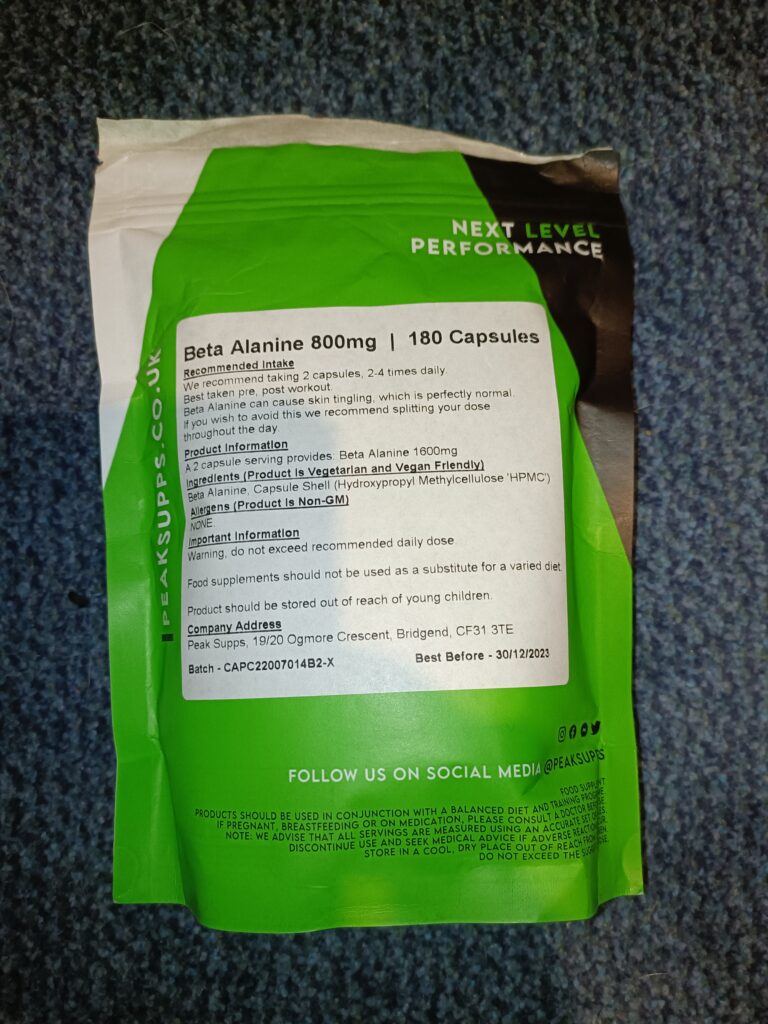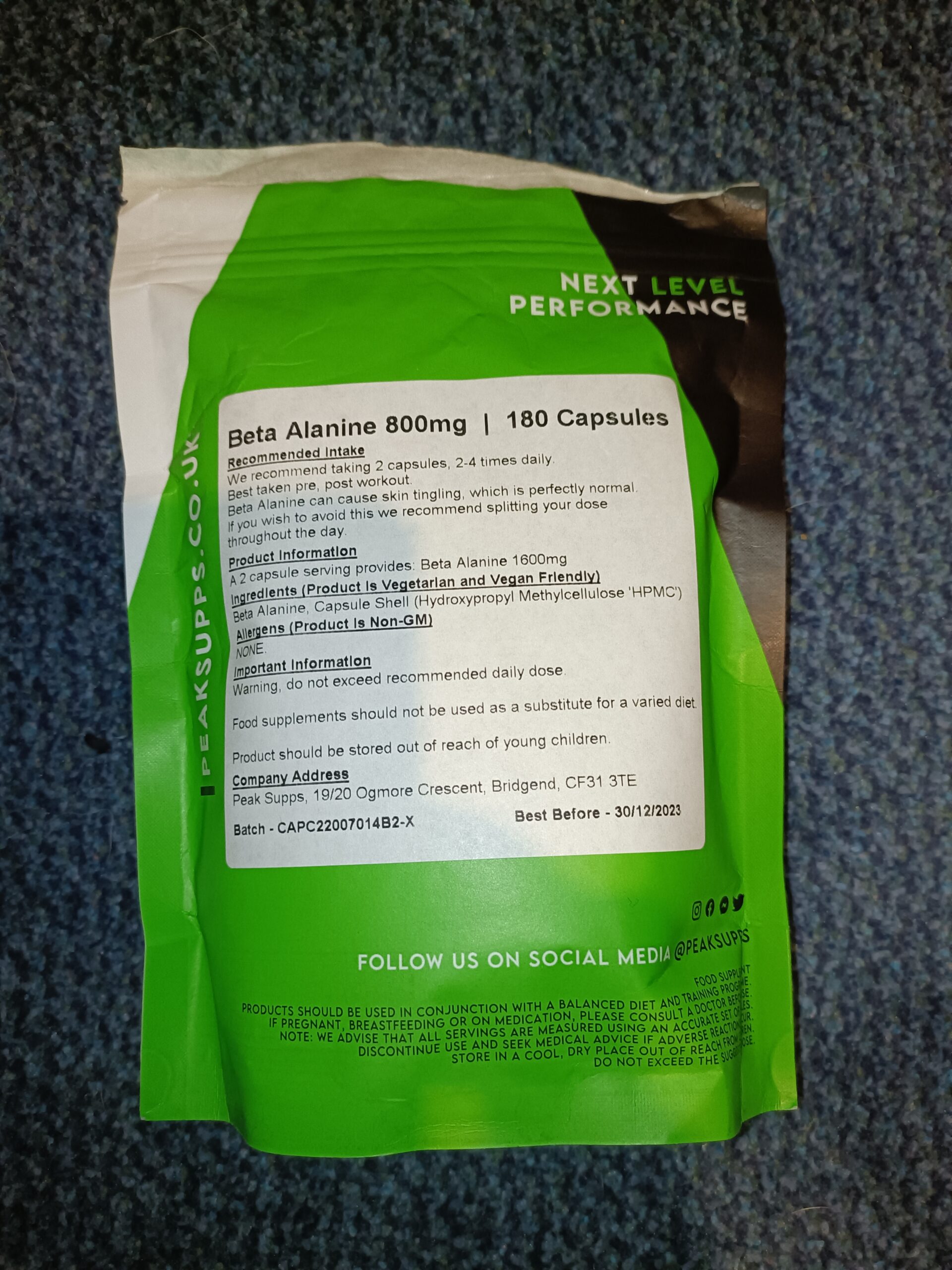Beta-alanine is a popular supplement among runners and athletes looking to improve their endurance and performance. Beta-alanine is a non-essential amino acid that helps to increase the levels of carnosine in the muscles. Carnosine is a dipeptide that helps to buffer lactic acid, which is a by-product of energy production and can lead to muscle fatigue and failure.
Benefits of Beta-alanine for Runners
Benefits:
- Improved Endurance: Beta-alanine can help to increase endurance in runners by delaying the onset of muscle fatigue. By buffering lactic acid, beta-alanine can help to improve the muscles' ability to contract for longer periods, allowing runners to maintain a faster pace for a longer time.
- Increased Power Output: Beta-alanine has been shown to increase power output during high-intensity exercises. This can be beneficial for runners who need to sprint or run up hills during their workouts or races.
- Increased Muscle Mass: Beta-alanine can help to increase muscle mass over time, which can improve overall running performance. This is because larger muscles can generate more force and power, allowing for faster and more efficient running.
Limitations of Beta-alanine for Runners
Limitations:
- Side Effects: Some users may experience a tingling or flushing sensation after taking beta-alanine. This is a harmless side effect that occurs due to the supplement's ability to increase blood flow to the muscles.
- Requires Consistent Use: Beta-alanine needs to be taken consistently over time to achieve its full benefits. It may take several weeks of supplementation before users notice a significant improvement in their performance.
- May Not Be Effective for Everyone: Beta-alanine may not work for everyone, and some users may not notice any significant improvements in their performance. It is essential to consult with a healthcare professional before starting any new supplement regimen to determine if it is safe and appropriate for you.
Summary of Beta-alanine
Overall, beta-alanine can be a beneficial supplement for runners looking to improve their endurance, power output, and muscle mass. However, it is important to consider the limitations and potential side effects before starting a new supplement regimen. It is always best to consult with a healthcare professional before starting any new supplement or exercise program.

Suggested doses of Beta-alanine
The recommended dose of beta-alanine varies depending on the individual's weight, fitness level, and goals. However, the most commonly used dose is between 2 to 5 grams per day, divided into smaller doses throughout the day to minimize side effects such as tingling and flushing sensations.
According to a meta-analysis of 15 studies, beta-alanine supplementation of 2-6 grams per day for 4-10 weeks has been shown to increase muscle carnosine levels by up to 80% (Stegen et al., 2012). This increase in carnosine levels has been associated with improvements in endurance performance and high-intensity exercise capacity.
In terms of the optimal dose for endurance athletes, a study of highly trained cyclists found that a dose of 6.4 grams per day for 4 weeks was able to increase their time to exhaustion by 12% (Hill et al., 2007).
Another study showed that a dose of 3.2 grams per day for 4 weeks was able to increase the distance covered during a high-intensity running test by 13.7% (Baguet et al., 2010).
It is worth noting that some studies have reported benefits with lower doses of beta-alanine, while others have used higher doses. Therefore, it is important to consult with a healthcare professional to determine the appropriate dose based on individual needs and goals.
In conclusion, the recommended dose of beta-alanine for runners and endurance athletes is typically between 2 to 5 grams per day, divided into smaller doses throughout the day to minimize side effects. However, optimal dosing may vary based on individual needs and goals, and consulting with a healthcare professional is always recommended before starting any new supplement regimen.
References for suggested doses
References:
Stegen, S., Bex, T., Vervaet, C., Vanhee, L., Achten, E., & Derave, W. (2012). Beta-alanine dose for maintaining moderately elevated muscle carnosine levels. Medicine and science in sports and exercise, 44(4), 756–763. https://doi.org/10.1249/MSS.0b013e31823fcd3a
Hill, C. A., Harris, R. C., Kim, H. J., Harris, B. D., Sale, C., Boobis, L. H., & Kim, C. K. (2007). Influence of beta-alanine supplementation on skeletal muscle carnosine concentrations and high intensity cycling capacity. Amino acids, 32(2), 225–233. https://doi.org/10.1007/s00726-006-0364-4
Baguet, A., Bourgois, J., Vanhee, L., Achten, E., & Derave, W. (2010). Important role of muscle carnosine in rowing performance. Journal of Applied Physiology, 109(4), 1096–1101. https://doi.org/10.1152/japplphysiol.00141.2010
Buying Beta-alanine Supplements
Search Beta Alanine Supplements
Scientific Study References
There have been numerous studies conducted on the effectiveness of beta-alanine in improving athletic performance, endurance, and muscle strength. Here are a few references to some of the most significant studies:
- Hill, C. A., Harris, R. C., Kim, H. J., Harris, B. D., Sale, C., Boobis, L. H., & Kim, C. K. (2007). Influence of beta-alanine supplementation on skeletal muscle carnosine concentrations and high-intensity cycling capacity. Amino acids, 32(2), 225-233.
- Derave, W., Ozdemir, M. S., Harris, R. C., Pottier, A., Reyngoudt, H., Koppo, K., ... & Achten, E. (2007). beta-Alanine supplementation augments muscle carnosine content and attenuates fatigue during repeated isokinetic contraction bouts in trained sprinters. Journal of applied physiology, 103(5), 1736-1743.
- Saunders, B., Elliott-Sale, K., Artioli, G. G., Swinton, P. A., Dolan, E., Roschel, H., ... & Sale, C. (2017). β-alanine supplementation to improve exercise capacity and performance: a systematic review and meta-analysis. British Journal of Sports Medicine, 51(8), 658-669.
- Baguet, A., Bourgois, J., Vanhee, L., Achten, E., & Derave, W. (2010). Important role of muscle carnosine in rowing performance. Journal of Applied Physiology, 109(4), 1096-1101.
- Quesnele, J. J., Laframboise, M. A., Wong, J. J., Kim, P., Wells, G. D., & Gurd, B. J. (2014). Beta-alanine supplementation improves aerobic and anaerobic indices of performance. Strength & Conditioning Journal, 36(4), 33-43.
These studies have shown that beta-alanine supplementation can improve athletic performance, endurance, and muscle strength, especially during high-intensity exercise bouts. However, as with any supplement, it is always important to consult with a healthcare professional before starting beta-alanine supplementation.
Consult Your Healthcare Professional
It is important for runners to consult with a healthcare professional before starting to use any other supplement.
